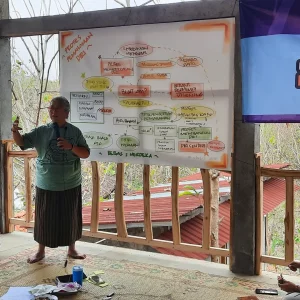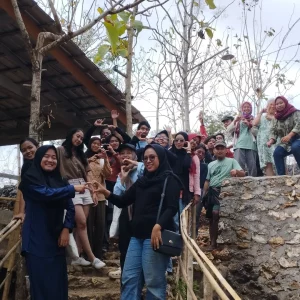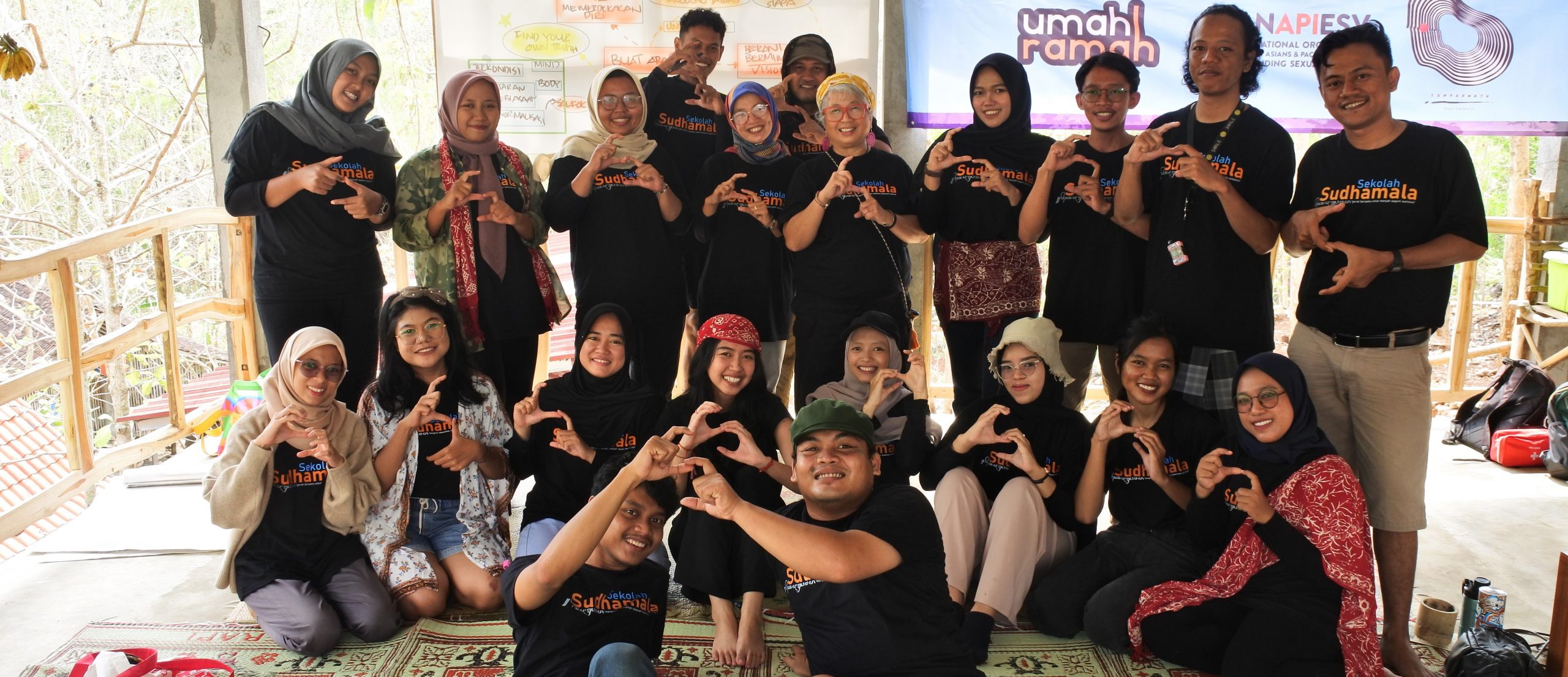By: Abdul Rosyidi
Umah Ramah together with the National Organization of Asians and Pacific Islanders Ending Sexual Violence (NAPIESV) carried out the Sudhamala School Retreat 2023. This activity was held at Padepokan Tompak Watu (Tompak Watu Learning Center), Girimulyo, Gunung Kidul-Yogyakarta, on Friday-Monday, November 10-13 2023. There were 20 participants who took part in this activity, consisting of 13 women, 6 men and 1 queer person. 10 of them are alumni of the first and second cohort of Sudhamala School in 2023. Meanwhile, the rest are activists and members of the Umah Ramah family.
On the first day, the activity began with an introduction to each participant. The next event continued with the reading of a joint prayer led by local community religious leaders from Legundi Hamlet, Girimulyo Village, Panggang District, Gunung Kidul Regency, Yogyakarta.
On the second day, the activities began with remarks from the Director of Umah Ramah, Asih Widiyowati and an introduction to the activities from the person in charge of Sudhamala School, Abdul Rosyidi. In his introduction, Rosyidi said that the retreat activities were a continuation of the Sudhamala School program which was implemented in June-October 2023.
In the Sudhamala School, Umah Ramah-NAPIESV provides knowledge and experience regarding sexuality and sexual violence. The approach used in this school is different because it prioritizes that the awareness that emerges originates from theoretical cognitive knowledge as well as intimate individual experience.
Understanding sexual violence is often misguided because it does not start from a correct understanding of sexuality. Meanwhile, sexuality itself cannot possibly be understood without first realizing its existence within oneself. Sexuality and its rights, both body and mind, must be understood within the “framework of the self” and the “framework of society” reciprocally and simultaneously in one breath.
Therefore, for this retreat, the organizers chose to give the theme “Stepping Aside to Find Yourself”. In hopes that the participants will be able to understand sexuality and sexual violence more comprehensively, not fragmented.
So in the Retreat activities, discussions about self-disclosure become the core of all the material. Mrs. Nina Jusuf from NAPIESV, provided material about the “Self-Understanding Process” through very interesting colorful charts. Among what she explained was the importance for individuals to recognize and understand themselves. To be yourself, one must have a sense of independence. However, this feeling is not easy to grasp because we are conditioned, both in body and mind.
Understanding yourself will ultimately lead to liberating yourself. And we cannot liberate ourselves without doing it ourselves. We cannot liberate ourselves by expecting others to give it to us. That’s why there is such a thing as struggle.
Ma’e – a nickname for Mrs. Nina Jusuf

The process of understanding and liberating oneself is carried out first with the courage to untangle the bonds that bind oneself. Critical questions towards anything that is considered ‘established’ are very important to do. From there the unraveling process can take a good first step.
Everyone actually has their own way of understanding life, but so far certain conditions have made us not dare to believe in the truth that is within us. We must slowly begin to eliminate the fear of the truth that arises from within, from the conscience. The way to do this is by continuing to calibrate ourselves, questioning our true existence: what it is for, what the purpose is, for whom, how to live life responsibly.
From this it can be seen that the feeling of freedom or mardika is not a manifestation of egoism or individualism, but rather a feeling of freedom that necessitates love for the universe, inclusive love. We can usually feel this sense of freedom when we have reached a “mediocre” condition, namely a condition where we do or do not do something without being based on personal tendencies, emotions or motives (kramadangsa).

On the third day, participants were asked to describe three basic things related to personal independence: what does independence mean to you? How do you embody this independence in everyday life? And what kind of help is needed to liberate yourself? Each participant took turns writing and expressing the three formulations.
On the same day, participants traveled to Pok Tunggal Beach, Gunung Kidul. On the beach, symbolically, in their own way, they let go of reribet (obstacles) that disturbed and burdened the process of self-discovery. At the same time, they calibrate the energy in the body with the abundant universal energy that is connected to all parts of the world, through the wind and water of the Indian Ocean.
The activities were closed after Isha that day. In the closing session, the organizers expressed their gratitude and reminded everyone that the process of self-understanding will not be completed by just knowing how to explain it. Likewise, when you have succeeded in unraveling one thing, there will always be other things that need to be unraveled. So the process of unraveling, understanding oneself, and becoming free will continue throughout life. ***
This article was translated by Napol Riel.
